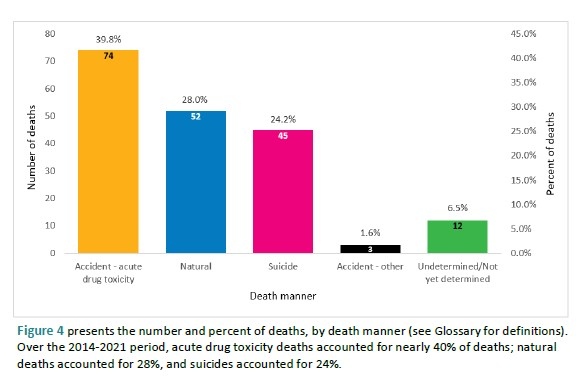Inmates in Ontario jails are dying at a 'dramatically' increasing rate, coroner's report shows
 An inmate can be seen inside a segregation cell at the Collins Bay Institution in Kingston, Ont., on Tuesday, May 10, 2016. THE CANADIAN/Lars Hagberg
An inmate can be seen inside a segregation cell at the Collins Bay Institution in Kingston, Ont., on Tuesday, May 10, 2016. THE CANADIAN/Lars Hagberg
A new report released by the office of Ontario's Chief Coroner suggests deaths among incarcerated populations have “risen dramatically” in recent years, painting a picture of a criminal justice system that is struggling to deliver on basic human rights.
The report, authored by the Ontario Chief Coroner’s expert panel on deaths in custody, examines non-homicide deaths of inmates from 2014 to 2021.
In all, there were 186 deaths during this period – with 19 deaths in 2014, 25 in 2019, and 46 in 2021. The main causes of death are identified as accidental overdoses, suicide, and "natural." When homicide deaths are factored in, the last eight years saw 192 inmates die while in provincial facilities.
“Any death that occurs in the custody of a provincial correctional facility is one too many,” the members of the panel said in their opening statement. “Persons who enter custody have [...] every reason to expect that those who assume control over so many aspects of their lives will at minimum protect them from harm and unwellness."
However, the report suggests the system is struggling to deliver on basic promises such as providing appropriate and up-to-date healthcare, ensuring correctional officers have comprehensive training in emergency care, mental health, trauma and violence-informed practices, and providing supportive programming to inmates.
“With very rare exception, almost every life lost in our sample could be deemed a preventable death,” it reads.
 Source: An Obligation to Prevent - Report from the Ontario Chief Coroner’s Expert Panel on Deaths in Custody
Source: An Obligation to Prevent - Report from the Ontario Chief Coroner’s Expert Panel on Deaths in Custody
The panel says, ultimately, the report revealed "much about "a criminal justice system that is struggling to deliver on basic promises [...], and an in-custody reality that in its current state is increasingly both ineffective and unsafe."
“The picture varies from opaque to astoundingly clear. The solutions range from simple to frustratingly complex. The need for action is simply compelling and urgent," the report reads.
Dr. Jerry Flores, an associate professor of sociology at the University of Toronto who has studied incarcerated populations for more than a decade, told CTV News Toronto Tuesday that while the numbers may not appear large at first, the increasing trend is reason for alarm.
“I think what's even more concerning is why they’re increasing,” Flores said. “Almost 40 per cent of these deaths have been attributed to acute drug toxicity and I think that that sort of points to a couple of larger issues.”
But, Flores says, for better or for worse, illicit drugs have made their way into Ontario prisons.
“I think the next step is really to understand how we can stop some of these deaths and the way we stop some of these deaths are by having quality access to healthcare,” he said.
In their report, the panel made 18 recommendations on how to improve inmate well-being and reduce the number of deaths inside correctional facilities, including the establishment of new quality standards for correctional health-care services in alignment with best practices from relevant professional colleges and organizations.
“To prevent a segment of the population from accessing healthcare, it starts to infringe on human rights,” Flores said. “How do we make sure that all incarcerated people have access to high-quality medical care which is guaranteed by the Charter of Rights and Freedoms?”
The panel’s recommendations stretch further than improving correctional health-care services – they also include, but are not limited to, moving away from maximum-security facilities when unnecessary, reducing the number of individuals in custody in pre-trial stages, and improving record keeping and public transparency.
“A lot of the facilities where these people are being housed are designed as maximum security facilities – really highly structured, highly surveilled places,” Flores said. ”However, most of Canada’s incarcerated population is there for nonviolent drug-related offenses, so many of these facilities aren't currently set up for that.”
When reached for comment, the Ministry of the Solicitor General, who oversees the operations of Ontario’s correctional facilities, said they extend their thanks to the chief coroner and panel for the insights provided in the report, and “will be taking time to review all of the recommendations and respond to the Chief Coroner within the requested six months”
“We must do everything possible to prevent deaths in custody, and we are focused on building a better, safer, and healthier corrections system in Ontario,” Andrew Morrison, spokesperson for the ministry, said in an emailed statement to CTV News Toronto.
“We know that the people who have died in custody were spouses, parents, children, grandchildren, siblings, friends, and that they mattered to all those they loved, and were loved by," he said.
Morrison said that a great deal of work is already underway to address the issues identified by the report, but that the government will continue to improve training for frontline staff and make strategic investments in infrastructure, staffing, and healthcare.
In the meantime, Flores said all levels of government need to increase funding and access to carceral facilities, along with funding research on incarcerated populations.
“There are plenty of able-bodied people in various sociology and criminology departments across Canada that can help find evidence-based solutions for these issues,” he said.
“So I think that we need to continue to do as much as we can to make these spaces more accessible, more open, and continue to lead research on some of the root causes of what's taking place.”
CTVNews.ca Top Stories

BREAKING Former soldier 'Canadian Dave' taken by the Taliban: sources
David Lavery, a former Canadian Forces soldier who helped approximately 100 people flee Afghanistan during the fall of Kabul, has been 'picked up' by the Taliban this week, according to multiple sources who spoke to CTV National News on the condition of anonymity.
Is Canada Post delivering mail today? What to know about the strike
With Canada Post workers on strike, many individuals and businesses are facing the challenge of sending and receiving mail. Here are the answers to some of Canadians’ most-asked questions.
Other countries seeking out advice from Canada ahead of Trump return: Joly
Foreign Affairs Minister Melanie Joly says Donald Trump's return to the White House has boosted Canada's influence in the world as other international partners turn to Canada for advice on how to deal with him.
Tracking respiratory viruses in Canada: RSV, influenza, COVID-19
As the country heads into the worst time of year for respiratory infections, the Canadian respiratory virus surveillance report tracks how prevalent certain viruses are each week and how the trends are changing week to week.
Canada Revenue Agency eliminating nearly 600 term positions by end of 2024
The Canada Revenue Agency will be eliminating approximately 600 temporary and contract employees across the country by mid-December.
Former Waterloo, Ont. school principal pleads guilty to luring, sending sexually explicit material
A former elementary school principal in Waterloo, Ont. has pleaded guilty to charges that include luring and transmitting sexually explicit material to someone believed to be under the age of 16.
'No excuse for this': Winnipeg apartment building without mail for a year
Going to the mailbox to check for letters and packages is a daily ritual for many of us, but not for people living at a Manitoba Housing complex in Winnipeg. They're cut off from their mail.
Montreal children's hospitals urging parents to avoid ERs
The two biggest children’s hospitals in Montreal - the CHU Sainte-Justine and Montreal Children's Hospital - are asking the parents to avoid bringing their children to the emergency room if possible due to a surge in patients.
Love story: Nova Scotia couple gets engaged at Taylor Swift's Toronto show
A Nova Scotia couple fulfilled their wildest dreams Thursday night when they got engaged at Taylor Swift’s Eras Tour in Toronto.


































